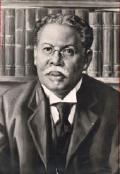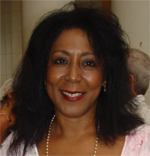He was born on July 12, 1854, in a sugar refinery in Matanzas. His parents, African slaves, gave him birth emancipated because they bought his freedom, from his mother’s womb.
A testimony to his full act has occurred, reports that near the end of his life, when he received from President Gerardo Machado the Carlos Manuel Cespedes Grand Cross – the highest republican award, he said “I am Juan Gualberto Gomez with or without the distinction.” The eternal supporter of the independence movement warned that Machado’s government was one of the most submissive to imperial interests of the time.
In 1879, when the Little War broke out in the fields of Cuba, Gomez a patriot of great values was linked with the revolutionaries. It was in the 70s when Gomez established friendship with Marti, who met at the lawyer’s office of Nicolas Azcarate. In the office of Dr. Miguel Viondi both met to conspire, but for his revolutionary activity is deported to Spain.
He was a person of great ability to write and a good journalist, who dedicated to the defense of blacks and mulattoes from the pages of several publications where, or was director or editor.
La Fraternidad y La igualdad two newspapers that for their names recalled the revolutionary France, , many of his works went against segregation and promoting respect for the men and women discriminated by the color of their skin .
In La Fraternitidad headband appeared the following epigram: independent political newspaper, devoted to the defense of the general interests the colored race. In this media made allegations against abuse blacks andmulattos, and become his defense spokesman, expressed through the publication of the correspondence he sent to the writing, the abuses to which this was submitted.
Other rotary newspapers where your items are included or where other work was determined to press were the La Republica Cubana, La Tribuna, El Abolicionista, El Progreso and El Pueblo. Some of the newspapers where he wrote were edited in France and even in Spain, where he lived as an exiled.
A shot in Havana were fashioned in a print mounted in the living home.
The scope of his work denouncing left its mark in other provinces of the island, where bodies trying these issues arose and reporters who followed his style bring to the fore the allegations or defenses sectors despised by skin color , o- as then – he said people of color.
When in 1892 , with the creation of the Cuban Revolutionary Party crystallized the idea of unification for independence among Cuban immigrants residing in the United States, Martí Juan Gualberto Gómez delegates on Cuban soil preparation of the Necessary War.
It was he who received the order sent by the National Hero authorizing the uprising that took place on February 24, 1895. That day in Ibarra, Matanzas journalist delegate of the Cuban Revolutionary Party won, but the action failed and caught he was sentenced to imprisonment in the dungeons of Ceuta, on the peninsula.
In 1898 he returned to Cuba permanently. That same year he was appointed member of the Assembly of Representatives and in 1900 was elected deputy for the province of Oriente to the Constituent Assembly, in which he engaged in his other battles, this time opposing the Platt Amendment, an ignominious disposal U.S. government that granted the right to intervene in the internal affairs of the nation.
As a Member of the Advisory Committee during the second U.S. military intervention, member of the House of Representatives or occupying a seat in the Senate, Juan Gualberto Gómez was always the same man of integrity that remained consistent with Marti’s legacy and eternal belligerence against the annexation and related ideologies supporters.
Companies active instruction and recreation for browns and tans, institutions which cooperated with the improvement and empowerment of its members , also became member claimed at that time to select and whitish Economic Society of Friends of the Country .
Tireless debater and orator with a strong personality, always advocate for black rights, but refused to create a political party just for them, wanted to Cuba, as José Martí appreciated it – with love of life and death, as one who knows love and forgive in a society where forgiveness was necessary. Like who really loves Cuba.
Translated by: Daysi Olano




